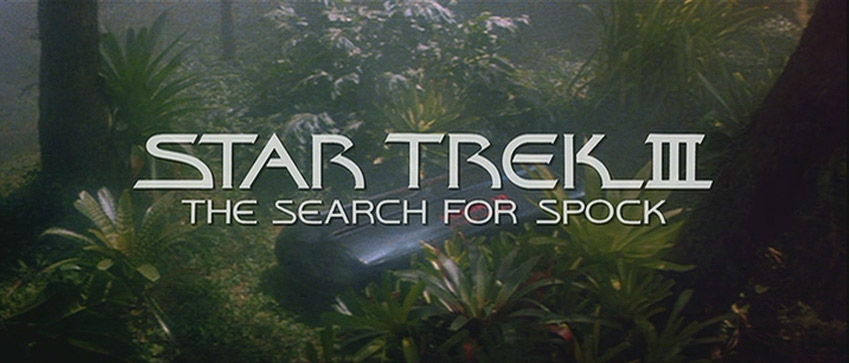
There is an old and commonly held belief that even-numbered Star Trek movies are inherently superior to odd-numbered ones. Khan is classic, Voyage Home is good character-driven fun, Undiscovered Country is a sharp thriller, and First Contact is the only really great Next Generation movie (sadly). The theory sort of breaks down with movies like Nemesis and the Abrams reboot, but it seemed sound for a while. And whether you buy into it or not, the theory exists, and it all started here, with the sequel to and undoing of The Wrath of Khan.
I'm viewing these three Star Trek movies as part of a "trilogy" set I bought -- II, III, and IV -- and viewed in that context you could say that The Search for Spock suffers from Act II-ism. Act I ends with the ultimate sacrifice, the loss of a loved one and a ship just as adrift as its captain. Act II begins by complicating things with obstacles and subplots -- McCoy is batshit, the Enterprise is being decommissioned, Spock's dad is pissed off and they all discover Spock's brain is still alive
The end result is just as muddled and unfocused as you'd expect, and gets a little silly to boot (the trajectory from somber to camp is actually a very distinct and easily chartable one, from Star Trek: The Motion Picture's austere 2001-ness to Star Trek V: The Final Frontier's total trainwreck). But it's only fair to add that many of the action sequences -- when summarized at least -- are quite inspired. It's fun to see the sterile-sleazy world of non-Federation Star Trek, though it's populated with an awful lot of neon lights and lava lamps, and it's fun to see what Kirk and McCoy and Sulu and the gang wear when they're not wearing color-coded velour (the answer: naugahyde, mostly, in deep earth tones and pinks). But really, all the fun of it is soiled by things like how bad the dialogue is, or how flat and incidental the characters all come off. (Even Kirk's reaction to [SPOILER] his son's death feels cheap and rushed.)
I'm no good at keeping my comments short anymore, but I can't walk away without saying two more things, one complimentary and the other critical. One: the one theme they really do play, more as an echo from the preceding film than anything else, is the idea that Spock and Kirk are really one man. Constant references are made to Kirk saving himself by saving Spock, going so far as to saying that not saving Spock would have lost Kirk his soul. I personally include McCoy in this triumvirate... Id, Ego, and Supergo? perhaps. For this reason I found it extra satisfying that it was McCoy and not Kirk who bore Spock's mind, while Kirk is burdened with a hole in his soul. What a crazy three-way symbiosis!
And lastly, back to criticizing some more: I don't want to get into it, but I kept seeing great opportunities for characterization or deeper explorations of themes, but the story was so excited by its own plot and many disparate obstacles and threats and goals that it never takes the time to stop and explore anything along the way.
Admittedly, the movie's got an awful lot of plates to keep spinning.

No comments:
Post a Comment